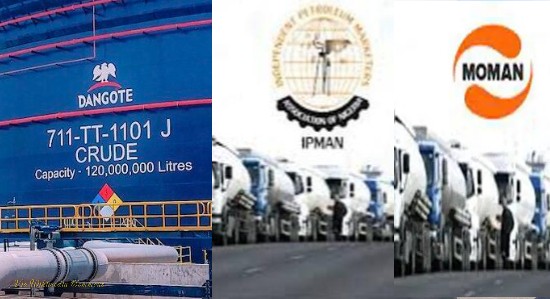Nigerian oil marketers are increasingly turning to bulk-purchase agreements with the Dangote Petroleum Refinery to stabilize prices and reduce operational costs. This shift follows a surge in ex-depot prices by depot owners, who recently raised the cost of premium motor spirit (PMS) from N909 to N950 per liter due to rising global crude oil prices.
The rising cost of fuel has put pressure on marketers and consumers alike, creating a need for more cost-effective solutions. By leveraging bulk-purchase agreements with the Dangote Petroleum Refinery, marketers hope to circumvent the unpredictability of third-party depots and secure a steady supply of petroleum products at more competitive rates.
Dangote Petroleum Refinery: Major Operators Lead the Charge
Prominent downstream operators such as MRS Oil Nigeria Plc, Ardova Plc, and Heyden Petroleum have already signed bulk-purchase agreements with the Dangote Refinery. These partnerships have proven advantageous, enabling operators like MRS to reduce pump prices to N935 per liter across its nationwide network.
This strategic collaboration underscores the refinery’s pivotal role in Nigeria’s fuel market, fostering competition among marketers. By offering incentives for bulk purchases, the Dangote Refinery empowers major operators to pass savings on to consumers, alleviating some of the financial burdens associated with fluctuating fuel prices.
IPMAN Encourages Collaboration Among Members
The Independent Petroleum Marketers Association of Nigeria (IPMAN) has urged its members to pool resources and meet the refinery’s minimum bulk-purchase requirement of two million liters at N909 per liter. According to IPMAN’s National President, Alhaji Abubakar Maigandi Garima, this strategy would allow members to bypass traditional depot owners, ensuring more stable pricing and reliable supply.
Garima emphasized that collective purchasing aligns with IPMAN’s broader objective of empowering independent marketers. By banding together, smaller players can access the same benefits enjoyed by larger operators, creating a level playing field in the industry.
Dangote Petroleum Refinery’s Vision for Market Stabilization
The management of the Dangote Petroleum Refinery has reiterated its commitment to stabilizing Nigeria’s fuel market. Through bulk-purchase agreements, the refinery aims to enhance energy security by guaranteeing a steady supply of petroleum products at affordable prices.
This initiative aligns with the Nigerian government’s broader policy of deregulating the oil processing sector. By reducing the country’s dependence on imported petroleum products, the refinery is poised to play a transformative role in reshaping the nation’s energy landscape.
OPEC Raises Concerns Over Market Impact
While the Dangote Refinery’s operations have brought significant benefits to Nigeria, they have also drawn scrutiny from the Organisation of the Petroleum Exporting Countries (OPEC). In its January 2025 Monthly Oil Market Report, OPEC highlighted concerns about the refinery’s increasing petrol production and its potential impact on the European market.
The report noted that the refinery’s operations could exacerbate the existing gasoline surplus in Europe, particularly in the Amsterdam-Rotterdam-Antwerp (ARA) trading hub. With subdued demand and oversupply issues already prevalent, the additional volumes from Nigeria are intensifying the need for trade flow adjustments.
A Global Shift in Trade Dynamics
The Dangote Petroleum Refinery’s commencement of operations in December 2023 marked a turning point for Nigeria, reducing its dependence on European imports and increasing domestic production. This shift has created an influx of refined petroleum products in international markets, necessitating adjustments in trade flows and export destinations.
OPEC’s report underscores the importance of addressing these challenges to maintain market stability. As Nigeria’s petrol production grows, exporters must identify new markets and adapt to evolving trade dynamics to mitigate the impact on regions like Europe.
The Dangote Petroleum Refinery’s bulk-purchase agreements have emerged as a vital tool for Nigerian oil marketers seeking price stability and operational efficiency. However, the refinery’s impact extends beyond national borders, influencing global trade dynamics and prompting strategic adjustments by key stakeholders. As the industry evolves, collaboration between marketers, government entities, and international organizations will be crucial to navigating these complex challenges.
Table of Contents
Discover more from OGM News NG
Subscribe to get the latest posts sent to your email.














